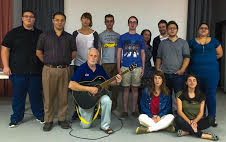October 2015 - News!
Conferences, Symposiums, Workshops view all upcoming
-
Virtuosity – An interdisciplinary symposium, 3–6 March 2016, The Liszt Academy of Music, Budapest. LINK
AIRS News
-
Rachel Heydon (University of Western Ontario) is giving a talk on her work that focuses on engaging older adults in arts activities (including singing) through use of iPads, October 1st at Museum London, at an event called ArtSAGE (about creative aging).
-
Esther Mang (Hong Kong Baptist University) has organized an International Symposium October 3rd in Kowloon “When music meets cognitive science” with Graham Welch, University College London, a keynote speaker on the topic “Singing and hearing: ‘ability’ and “disability’. Dr. Mang will also present on “Coalescing music and cognitive science: issues of cross-disciplinary challenges”
-
The following papers from AIRS researchers will be presented at the annual meeting of the Canadian Acoustical Association that will take place in Halifax October 7th – 9th. Both Frank Russo and Annabel Cohen are chairing sessions. Frank Russo is President of the Association.
-
Frank Russo & Stephen Livingstone: The Ryerson Audio-Visual Database of Emotional Speech and Song (Ryerson University, Toronto)
-
Leslie Phillmore, and Jordan Fisk, Dalhousie University, Simone Falk, Ludwig Maximillians University, Germany, Christine Tsang, Huron College of Western University. Do finches speak Russian? Songbirds can discriminate infant-directed song and speech.
-
Wladyslaw Cichocki: The timing of accented phrases in read and spontaneous speech: Data from Acadian French (University of New Brunswick)
-
Derek Hughes, Bing-Yi Pan, Annabel Cohen, (University of Prince Edward Island). Performance on two tasks of the AIRS Test Battery of Singing Skills in persons with cochlear implants. (Hughes is current a graduate student at Dalhousie University)
-
-
Godfrey Baldacchino, University of Malta, sent this photo of a fine start to the Degree Plus Choir/Song Circle experience for the 2015-16 academic year. Students from Denmark, Sweden, Belgium, USA, Italy and Malta, along with the animate guitarist Frank O'Neill, enjoyed the first of hopefully many more hours of singing fun with the Multicultural Song Circle of the University of Malta.

-
The ice-breaker effect: singing mediates fast social bonding, Eiluned Pearce, Jacques Launay, Robin I. M. Dunbar, Royal Society Open Science, 2, 150221. LINK
Abstract
It has been proposed that singing evolved to facilitate social cohesion. However, it remains unclear whether bonding arises out of properties intrinsic to singing or whether any social engagement can have a similar effect. Furthermore, previous research has used one-off singing sessions without exploring the emergence of social bonding over time. In this semi-naturalistic study, we followed newly formed singing and non-singing (crafts or creative writing) adult education classes over seven months. Participants rated their closeness to their group and their affect, and were given a proxy measure of endorphin release, before and after their class, at three timepoints (months 1, 3 and 7). We show that although singers and non-singers felt equally connected by timepoint 3, singers experienced much faster bonding: singers demonstrated a significantly greater increase in closeness at timepoint 1, but the more gradual increase shown by non-singers caught up over time. This represents the first evidence for an ‘ice-breaker effect’ of singing in promoting fast cohesion between unfamiliar individuals, which bypasses the need for personal knowledge of group members gained through prolonged interaction. We argue that singing may have evolved to quickly bond large human groups of relative strangers, potentially through encouraging willingness to coordinate by enhancing positive affect.
- Log in to post comments

